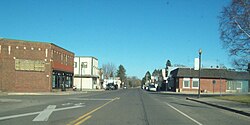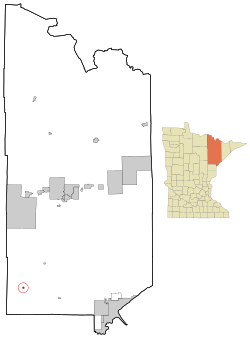Floodwood, Minnesota
| Floodwood, Minnesota | |
|---|---|
| City | |
| City of Floodwood | |
 |
|
| Nickname(s): The Catfish Capital of the World | |
| Motto: A City for All Seasons | |
 Location of the city of Floodwood within Saint Louis County, Minnesota |
|
| Coordinates: 46°55′37″N 92°54′57″W / 46.92694°N 92.91583°W | |
| Country | United States |
| State | Minnesota |
| County | Saint Louis |
| Incorporated | 1899 |
| Government | |
| • Mayor | Jeff Kletscher |
| Area | |
| • Total | 1.42 sq mi (3.68 km2) |
| • Land | 1.42 sq mi (3.68 km2) |
| • Water | 0 sq mi (0 km2) |
| Elevation | 1,250 ft (381 m) |
| Population (2010) | |
| • Total | 528 |
| • Estimate (2012) | 528 |
| • Density | 371.8/sq mi (143.6/km2) |
| Time zone | Central (CST) (UTC-6) |
| • Summer (DST) | CDT (UTC-5) |
| ZIP code | 55736 |
| Area code(s) | 218 |
| FIPS code | 27-21338 |
| GNIS feature ID | 0661287 |
| Website | floodwood.govoffice.com |
Floodwood is a city in Saint Louis County, Minnesota, United States. Population was 528 at the 2010 census.
Originally a logging community, it was a dairy community for most of its history, but could now be best described as a bedroom community, since most of its working population finds employment in nearby Duluth, Grand Rapids, Hibbing and Cloquet. The city describes itself as "The Catfish Capital of the World", a nickname it gave to itself following the introduction of the community's annual Catfish Days festival.
U.S. Highway 2 and State Highway 73 (MN 73) are two of the main routes in Floodwood.
Long before the city of Floodwood existed, its strategic location at the intersection of the East Savanna River with the Saint Louis River made what would later become the city of Floodwood a strategic economic location. The Savanna Portage was a major route for transportation in the southern Arrowhead, but its importance was magnified greatly with the arrival of European fur traders, who used the route to access rich resources of beaver and other fur animals in the upper Mississippi valley. As early as 1679, Europeans were passing by the modern location of Floodwood as they turned from the Saint Louis River to the East Savanna River on their way to the portage.
However, it was not until the late 19th century that homesteads began to appear in the area. In 1889, it was announced that a railroad would pass through the area. This announcement led to a local population boom in anticipation of the opportunities the railroad would bring. In 1890 J. C. Campbell began large-scale logging operations in the area and the C. N. Nelson Lumber Company of Cloquet built a logging railroad in the area (albeit, the logging railroad only operated in the winter - during the summer, the logging operations took advantage of the Saint Louis River to transport timber to mills in Cloquet).
...
Wikipedia
